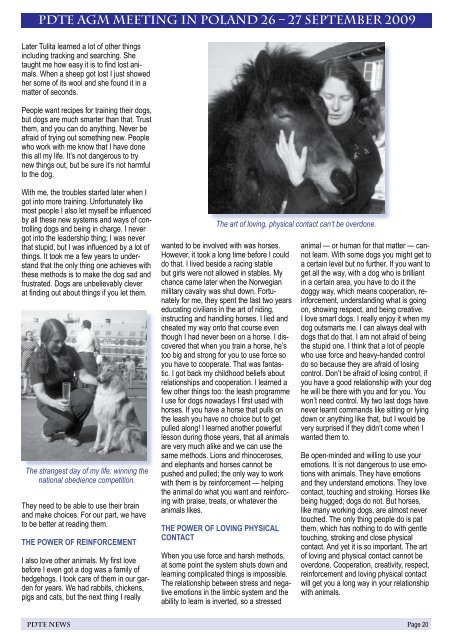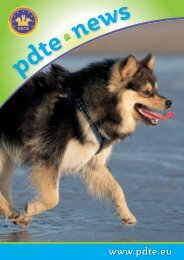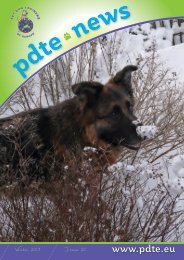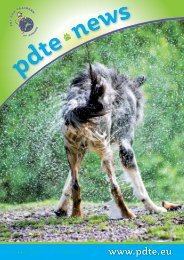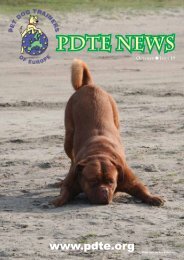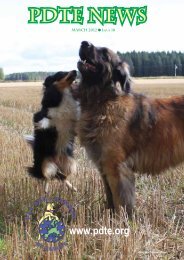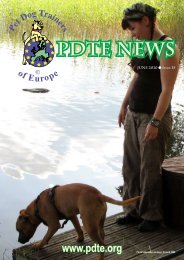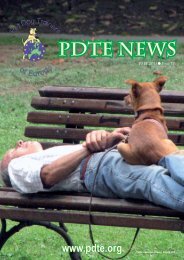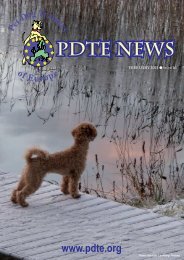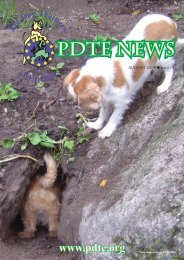PDTE 2010 January Newsletter
You also want an ePaper? Increase the reach of your titles
YUMPU automatically turns print PDFs into web optimized ePapers that Google loves.
<strong>PDTE</strong> AGM MEETING In Poland 26 – 27 September 2009<br />
Later Tulita learned a lot of other things<br />
including tracking and searching. She<br />
taught me how easy it is to find lost animals.<br />
When a sheep got lost I just showed<br />
her some of its wool and she found it in a<br />
matter of seconds.<br />
People want recipes for training their dogs,<br />
but dogs are much smarter than that. Trust<br />
them, and you can do anything. Never be<br />
afraid of trying out something new. People<br />
who work with me know that I have done<br />
this all my life. It’s not dangerous to try<br />
new things out, but be sure it’s not harmful<br />
to the dog.<br />
With me, the troubles started later when I<br />
got into more training. Unfortunately like<br />
most people I also let myself be influenced<br />
by all these new systems and ways of controlling<br />
dogs and being in charge. I never<br />
got into the leadership thing; I was never<br />
that stupid, but I was influenced by a lot of<br />
things. It took me a few years to understand<br />
that the only thing one achieves with<br />
these methods is to make the dog sad and<br />
frustrated. Dogs are unbelievably clever<br />
at finding out about things if you let them.<br />
The strangest day of my life: winning the<br />
national obedience competition.<br />
They need to be able to use their brain<br />
and make choices. For our part, we have<br />
to be better at reading them.<br />
THE POWER OF REINFORCEMENT<br />
I also love other animals. My first love<br />
before I even got a dog was a family of<br />
hedgehogs. I took care of them in our garden<br />
for years. We had rabbits, chickens,<br />
pigs and cats, but the next thing I really<br />
The art of loving, physical contact can’t be overdone.<br />
wanted to be involved with was horses.<br />
However, it took a long time before I could<br />
do that. I lived beside a racing stable<br />
but girls were not allowed in stables. My<br />
chance came later when the Norwegian<br />
military cavalry was shut down. Fortunately<br />
for me, they spent the last two years<br />
educating civilians in the art of riding,<br />
instructing and handling horses. I lied and<br />
cheated my way onto that course even<br />
though I had never been on a horse. I discovered<br />
that when you train a horse, he’s<br />
too big and strong for you to use force so<br />
you have to cooperate. That was fantastic.<br />
I got back my childhood beliefs about<br />
relationships and cooperation. I learned a<br />
few other things too: the leash programme<br />
I use for dogs nowadays I first used with<br />
horses. If you have a horse that pulls on<br />
the leash you have no choice but to get<br />
pulled along! I learned another powerful<br />
lesson during those years, that all animals<br />
are very much alike and we can use the<br />
same methods. Lions and rhinoceroses,<br />
and elephants and horses cannot be<br />
pushed and pulled; the only way to work<br />
with them is by reinforcement — helping<br />
the animal do what you want and reinforcing<br />
with praise, treats, or whatever the<br />
animals likes.<br />
THE POWER OF LOVING PHYSICAL<br />
CONTACT<br />
When you use force and harsh methods,<br />
at some point the system shuts down and<br />
learning complicated things is impossible.<br />
The relationship between stress and negative<br />
emotions in the limbic system and the<br />
ability to learn is inverted, so a stressed<br />
animal — or human for that matter — cannot<br />
learn. With some dogs you might get to<br />
a certain level but no further. If you want to<br />
get all the way, with a dog who is brilliant<br />
in a certain area, you have to do it the<br />
doggy way, which means cooperation, reinforcement,<br />
understanding what is going<br />
on, showing respect, and being creative.<br />
I love smart dogs. I really enjoy it when my<br />
dog outsmarts me. I can always deal with<br />
dogs that do that. I am not afraid of being<br />
the stupid one. I think that a lot of people<br />
who use force and heavy-handed control<br />
do so because they are afraid of losing<br />
control. Don’t be afraid of losing control; if<br />
you have a good relationship with your dog<br />
he will be there with you and for you. You<br />
won’t need control. My two last dogs have<br />
never learnt commands like sitting or lying<br />
down or anything like that, but I would be<br />
very surprised if they didn’t come when I<br />
wanted them to.<br />
Be open-minded and willing to use your<br />
emotions. It is not dangerous to use emotions<br />
with animals. They have emotions<br />
and they understand emotions. They love<br />
contact, touching and stroking. Horses like<br />
being hugged; dogs do not. But horses,<br />
like many working dogs, are almost never<br />
touched. The only thing people do is pat<br />
them, which has nothing to do with gentle<br />
touching, stroking and close physical<br />
contact. And yet it is so important. The art<br />
of loving and physical contact cannot be<br />
overdone. Cooperation, creativity, respect,<br />
reinforcement and loving physical contact<br />
will get you a long way in your relationship<br />
with animals.<br />
<strong>PDTE</strong> NEWS Page 20


